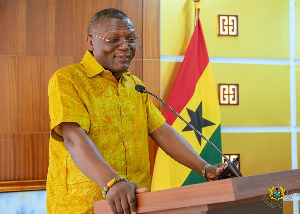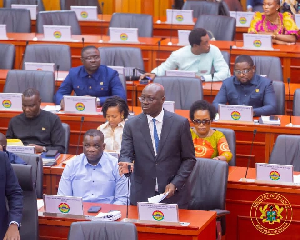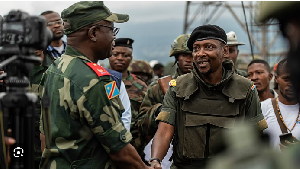 Tensions persist as Ghana's flamboyant former president remains a powerful influence
Tensions persist as Ghana's flamboyant former president remains a powerful influence
When Jerry Rawlings, who has dominated life in Ghana for the past 20 years, peacefully handed over power to the elected opposition candidate in January, the country’s democratic transition was widely hailed as a model for the rest of Africa, where longtime leaders seldom leave power gracefully. But almost six months later the West African country is finding out just how difficult and complex such a transition can be. And Rawlings, a former flight lieutenant who led two military coups and won elections in 1992 and 1996, continues to cast a long shadow over the political landscape.
The constant sniping between Rawlings and the new government of President John Kufuor has undermined the stability and national reconciliation that both men promised during the transition.
With no precedent in Ghana’s 44 years of independence of rulers ceding power to a duly elected opposition, both parties are adjusting to new roles. But with Ghana burdened with $6-billion in foreign debt and prices for its main exports of cocoa and gold still low, the jockeying has slowed down badly needed economic reforms and kept foreign investors at bay, say analysts and diplomats.
Rawlings, flamboyant leader of the National Democratic Congress (NDC) and darling of Africa’s socialist revolutionaries before embracing free-market reforms in the mid-1980s, has never been in the legal opposition before. Kufuor, a British-educated lawyer and businessman who leads the New Patriotic Party, has never before held power.
The challenge for Kufuor, says E Gyimah-Boadi, director of the Centre for Democracy and Development in Accra, is how to deal with “the perceived threat Rawlings presents to the regime. He twice led successful coups, is an inveterate rabble-rouser and populist, and you can’t help but take him seriously.”
On the other side, Gyimah-Boadi says, is a party that “has been out of power for 30 years, with a lot of people who feel that now is their chance” to exact revenge for abuses during the Rawlings years and “cut Rawlings down to size”.
As it left office, the Rawlings government enraged people by allotting many of its members generous “end-of-service benefits” that cost the government millions of dollars. NDC legislators, many of whom were reelected and not retiring, were among those who received the largesse. Many NDC officials were also allowed to buy government vehicles at less than 30% of their market value and given other perks.
“Ghanaians are not at all amused at what many consider to be a last-minute raid on the public treasury by a government that has left a legacy of red on Ghana’s books without leaving behind assets or investments of equal value,” says H Kwasi Prempeh of the Centre for Democracy and Development. And many people are upset that the government will continue to provide Rawlings with a house and security detail. He has, however, lost his access to air force jets he could once fly at will.
The most serious clash began this month when Rawlings, celebrating the anniversary of his 1979 takeover, gave a speech implying that Kufuor did not have the confidence of the military, a claim that was widely interpreted as being the threat of another coup. One of Kufuor’s first acts was to abolish the national holidays marking that date and the anniversary of the second coup, December 31 1981, which ushered in the Rawlings era. But in response to Rawlings’s speech the military leadership pledged its loyalty to the government.
“The former president has benefited from being a coup leader, and I am not surprised he looks at the situation with nostalgia,” says Kwame Addo-Kufuor, the Minister of Defence and the president’s brother, in an interview. “But that nostalgia is not shared by most Ghanaians or the Ghanaian military.”
Diplomats say that, while Rawlings has pockets of support, there is no indication of a military plot. But the speech and response sparked a furore, culminating this month in several dozen soldiers and police officers searching Rawlings’s housing compound for weapons.
In response, the NDC leadership sent a sharply worded letter to Kufuor. “Your government, by its actions, is almost justifying the unconstitutional behaviour of some African heads of state who would not want to leave office at the end of their tenures,” it said. “For after all, who would want to quietly and smoothly hand over power if the reward is harassment, intimidation, embarrassment and even imprisonment without justifiable cause?”
The Kufuor government has also launched investigations into alleged corruption during the Rawlings years. But analysts and diplomats point out that the president has yet to fulfil his campaign promise to make his financial interests public or institute serious conflict-of-interest rules for senior government officials.
Diplomats and observers say that, while Rawlings has been provocative, Kufuor’s harsh counterattacks may be intended to distract attention from the unpopular economic measures he has taken, such as raising fuel prices by 64% and doubling electricity and water prices.
“Kufuor does not have a lot to offer the people in terms of food,” says Yao Graham, a political analyst, “so he has to let the circus run.”
A veteran diplomat in Accra described growing international unease over the attacks on Rawlings, saying that “Kufuor promised reconciliation but some elements of the party want to destroy Rawlings, and that is a very worrisome trend”.
The tensions are likely to remain high. Kufuor has authorised the formation of a truth commission to investigate human rights abuses under the Rawlings governments.












